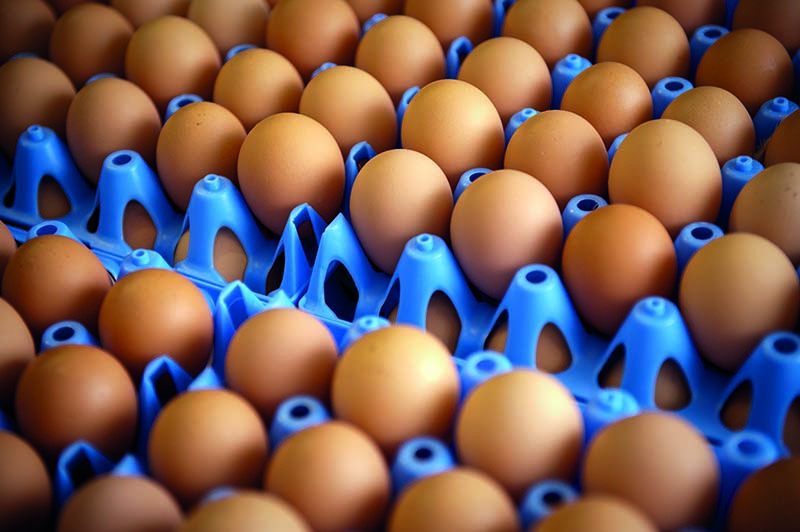
Free range producers with eggs piling up in the Yorkshire avian influenza zone are desperately awaiting clearance from DEFRA to move their eggs off farm.
A 10-kilometre exclusion zone is being enforced around a 6,000-bird duck breeding farm near Driffield in the East Riding of Yorkshire following a confirmed outbreak of highly pathogenic AI. Culling has begun on the affected farm and movements of all poultry, products and waste within the restriction zone has been banned. The restrictions have impacted on egg producers in the zone, who are currently unable to ship their eggs off to packing stations.
Stewart Elliott of the egg co-operative Eggsell, which is based in the East Riding, said that they had, fortunately, made a collection just before the area was sealed off, but he said that unless they could get permission to move other eggs from the zone by the end of the week the eggs would not be able to be sold as class A. “Six days and the eggs will have to be dongraded,” he said. “Fortunately we made a collection from producers inside the zone on Sunday. We don’t normally collect on Sundays but we did so this time because we were short of eggs. In that respect we are all right at the moment. It’s worked out as well as we could have expected.”
Tim Warkup, who has 30,000 free range birds on two sites in North Frodingham, which is within the surveillance zone, and who supplies Noble Foods, told the Yorkshire Post that he had a collection on Sunday, too, but he did not know when there would be another collection because of the restrictions imposed by the Department for Environment, Food and Rural Affairs.
The Eggsell packing station, which is near Driffield, is outside the exclusion zone but Stewart Elliott said that Eggsell did have producers inside the restricted area. “We have been talking to DEFRA every day. We need a special licence from them to move eggs out of the zone. As long as we can get that we should be OK but I don’t know how long it will take. If we can shift the eggs by Friday they will be able to go as class A. Otherwise they will have to be downgraded.”
Robert Gooch, director of policy with the British Free Range Egg Producers’ Association (BFREPA), told the Ranger that BFREPA was pressing for licences to be issued as soon as possible. “They have said they will do so but they have not wanted to encourage too much activity in the affected area too early. We have not got the go-ahead yet but we are hopeful that something may happen within the next 24 hours,” he said.
So far the outbreak appears to have been contained to the duck breeding farm where the AI was detected. There have been no reports of any other farms in Yorkshire being affected, although scientists have confirmed that the strain of AI involved on the duck unit is the same H5N8 strain involved in outbreaks in Germany and the Netherlands.
DEFRA has said that measures put in place in East Yorkshire followed “tried and tested procedures for dealing with avian flu outbreaks.” DEFRA said, “The advice from the chief medical officer and Public Health England remains that the risk to public health is very low. The Food Standards Agency have said there is no food safety risk for consumers.”
The National Farmers’ Union (NFU) also issued a statement. The union’s chief poultry adviser, Gary Ford, said, "The NFU is working with Defra and Public Health England and understand that the risk to human health from this incident is very low.”
Public Health England issued a statement, which read, “Public Health England are assisting Defra in the investigation of an avian flu outbreak at a duck breeding farm in Yorkshire. Based on what we know about this specific strain of avian influenza, the risk to human health in this case is considered extremely low.’'
The European Union, which had already been informed of the outbreaks in Germany and the Netherlands, says it has been made aware of the outbreak in the United Kingdom. It said the three affected member states were taking necessary measures, including the “culling of the poultry, the establishment of protection and surveillance zones, the introduction of sanitary measures (cleaning and disinfection), the prohibition of movements to sell live poultry, eggs, poultry meat and other poultry products to other EU countries and non-EU countries and the culling of affected flocks only in the restricted zones. The Commission is also informing other EU member states and non-EU countries, as well as international organisations about the disease situation and on the measures taken.”
The European Commission said in a statement that although investigations were ongoing to identify the possible source of virus “the fact that the three recent outbreaks in Germany, the Netherlands and the UK have occurred in proximity of humid areas with wild birds and the absence of any other possible epidemiological link between them point towards wild migratory bird as a possible source of virus.”
The Commission said that a species of wild swans might be carrying the virus without showing signs of disease. It said that concerned member states were evaluating their wild bird surveillance data and were enhancing monitoring. It said the Commission had asked member states to increase bio-security on farms.
